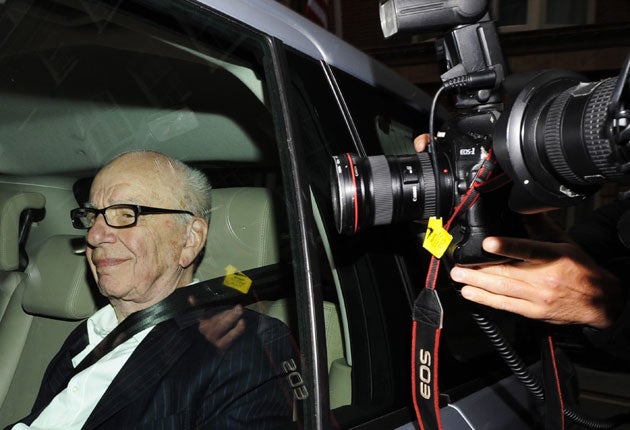Rupert breaks his silence to defend himself, his son and his embattled empire

Your support helps us to tell the story
From reproductive rights to climate change to Big Tech, The Independent is on the ground when the story is developing. Whether it's investigating the financials of Elon Musk's pro-Trump PAC or producing our latest documentary, 'The A Word', which shines a light on the American women fighting for reproductive rights, we know how important it is to parse out the facts from the messaging.
At such a critical moment in US history, we need reporters on the ground. Your donation allows us to keep sending journalists to speak to both sides of the story.
The Independent is trusted by Americans across the entire political spectrum. And unlike many other quality news outlets, we choose not to lock Americans out of our reporting and analysis with paywalls. We believe quality journalism should be available to everyone, paid for by those who can afford it.
Your support makes all the difference.Since his arrival in Britain to manage the phone-hacking crisis, just two words have been uttered in public by Rupert Murdoch.
His sole utterance came when he was confronted by camera crews as he emerged from his apartment in Mayfair with Rebekah Brooks, the embattled chief executive of News International. Asked what his first priority was, the octogenarian tycoon pointed at her and simply replied: "This one."
Otherwise he has only produced inscrutable smiles. All that changed last night when the News Corporation chairman spoke for the first time about the scandal that has paralysed his global media empire.
He chose a vehicle on the other side of the Atlantic to start making the case for the defence – the Wall Street Journal, which News Corp acquired four years ago.
Mr Murdoch maintained that his company had responded quickly and effectively to the welter of problems threatening to engulf it – and predicted it would rebuild its reputation.
He singled out Gordon Brown for criticism after the former prime minister accused News International in the Commons of "law-breaking on an industrial scale" and of acting as a "criminal media nexus".
Mr Murdoch retorted that he had "got it entirely wrong" and insisted "the Browns were always friends of ours" until the Sun abandoned its support for Labour before the last general election.
News International has already rebutted Mr Brown's accusations about its reporters' methods, saying the stories about him and his family were in the public interest and produced by legitimate means. Mr Murdoch said he had changed his mind over whether to appear before MPs on the culture select committee next week after being advised he would otherwise be summoned by the Commons authorities.
He explained that he wanted to address "some of the things that have been said in Parliament, some of which are total lies". He said: "We think it's important to absolutely establish our integrity in the eyes of the public . . . I felt that it's best just to be as transparent as possible."
In his WSJ interview, he was relatively voluble in defence of the company, insisting it had handled the crisis "extremely well in every way possible" and had only made "minor mistakes".
Mr Murdoch maintained the damage to News Corp was "nothing that will not be recovered", saying: "We have a reputation of great good works in this country." Asked if he was aggravated by the recent headlines it had attracted, he said he was "just getting annoyed", but added: "I'll get over it. I'm tired."
The WSJ said that Mr Murdoch had contacted the paper after it made inquiries about the status of his son, James, within News Corp.
He said his son's position was unchanged and rejected criticism that James reacted too slowly in dealing with the scandal.
"I think he acted as fast as he could, the moment he could," Mr Murdoch said. He said he had also acted appropriately and rapidly: "When I hear something going wrong, I insist on it being put right."
Mr Murdoch said reports he was considering selling his newspaper holdings were "pure and total rubbish" and said: "Give it the strongest possible denial you can give."
Following the abandoment of its planned BSkyB takoever, he said News Corp was "buying back shares and looking for better places to put our money".
He announced he would establish an independent committee headed by a "distinguished non-employee". It will "investigate every charge of improper conduct" and draw a "protocol for behaviour" for reporters across the company.
As Mr Murdoch took to the pages of his American newspaper to defend his company's managing of the crisis, a number of senators sought to increase the pressure for a US inquiry similar to that which taking place in the UK.
Four Democratic senators including Barbara Boxer and Frank Lautenberg called on the Department of Justice and Securities and Exchange Commission to investigate whether News Corp broke the law on either US or UK soil by hacking cell phones and allegedly bribing public officials.
Join our commenting forum
Join thought-provoking conversations, follow other Independent readers and see their replies
Comments